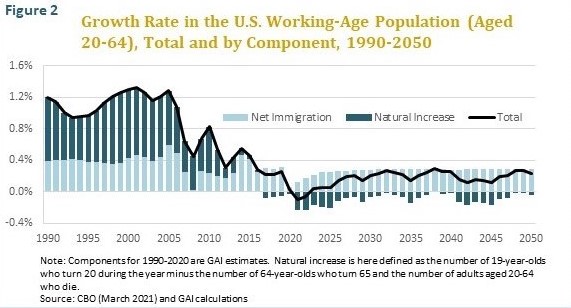Washington, DC – The Concord Coalition and the Global Aging Institute (GAI) today jointly released a new issue brief entitled The Vital Role of Immigration in an Aging America. The paper, which is part of a quarterly issue brief series called The Shape of Things to Come, explains that, even as immigration to the United States has been declining, its importance to the nation’s demographic and economic growth has been increasing.

“America’s story can in large part be told as a story of immigrants. Yet as important as immigration has always been in shaping America’s character and culture, it has never been as critical to growth and prosperity as it will be in the coming decades,” said Richard Jackson, President of the Global Aging Institute and author of the paper. “In the past,” he added, “immigrants were what kept the workforce growing. In the future, they will be all that keeps it from shrinking.”
“Immigration has become such a hot button political issue that it is nearly impossible to get beyond the partisan rhetoric and concentrate on the facts that should be informing policy decisions,” said Robert Bixby, Executive Director of The Concord Coalition. “There is considerable room for principled disagreement on matters of immigration policy, especially how to deal with border security and illegal immigration,” he added. “What is not in question is that an aging America would benefit from increased immigration. Unfortunately, immigration has been falling since the Great Recession.”
Key findings of the issue brief include:
- As the smaller cohorts born since the end of the postwar Baby Boom have climbed the age ladder, growth in the working-age population has been decelerating, from 1.7 percent per year in the 1970s to 0.7 percent per year since 2000. Over the next three decades, according to the Congressional Budget Office’s (CBO) latest March 2021 long-term projections, the working-age population will be growing at an average rate of just 0.2 percent per year.
- All of this growth will be attributable to net immigration, which the CBO assumes will gradually climb from its 2021 level of about 500,000 to between 1.0 and 1.1 million per year, significantly more than its average since the Great Recession. Without net immigration, the working-age population would actually shrink.
- Even with the substantial level of net immigration that the CBO projects, real GDP growth will sink to just 1.5 percent per year in the 2030s and 2040s, barely one-half of its postwar average. If net immigration fails to rise to the level that the CBO projects, the economic outlook would be even worse. On the other hand, if net immigration exceeds that level, the economic outlook could be considerably better.
- Immigration is therefore an indispensable key to maintaining economic growth in an aging America. Immigration not only increases employment growth, most economists believe that the greater diversity of skills and entrepreneurial initiative that immigrants bring to the economy also increases productivity growth.
- Although the potential economic advantages of immigration are widely recognized by economists, a number of common but largely misplaced concerns about the costs and benefits of immigration continue to distort the policy debate.
- One frequently heard concern is that immigrants take jobs from native-born workers. The issue brief explains that while this may be true at the firm level or even the industry level, at the economywide level immigration is a positive-sum proposition. In the aggregate, immigrant workers do not deny jobs to native-born workers any more than jobs for women deny jobs to men or jobs for the old deny jobs to the young. In fact, just the opposite is true. The jobs that immigrants take generate additional income, resulting in additional demand for goods and services that in turn translates into additional jobs.
- Another concern is that immigrants consume more in government benefits than they pay in taxes, and thus constitute a burden on native-born workers and taxpayers. The issue brief explains that, while immigrants may sometimes be a net burden on state and local budgets, most studies have concluded that at the federal level the net balance of taxes paid and benefits received tilts the other way. Almost all studies, moreover, have concluded that if we take a generational perspective and include the future tax contributions of immigrants’ children, the net fiscal impact of immigration at all levels of government is positive.
- Still another concern is that recent waves of immigrants are failing to assimilate as readily as earlier waves did. The issue brief finds little evidence for this. Immigrants have higher labor-force participation rates than native-born adults, and the trends in other measures of successful economic and social integration, such as English proficiency, are broadly positive.
“Several developed countries have made immigration the lynchpin of their long-term strategy for confronting population aging,” said Bixby. “Meanwhile, the United States continues to lurch from near-term crisis to near-term crisis.”
It is difficult to imagine how an aging America can be a prosperous America without the impetus to growth and the promise of renewal that immigration brings, the issue brief concludes. As we look to the future, it is incumbent upon federal policymakers to take a proactive, strategic approach to immigration policy. America has always been a nation of immigrants, and immigration still has a vital role to play in its aging future.
Click here to read the whole paper, “The Vital Role of Immigration in an Aging America”
Other papers in the series can be found by clicking here.
Tune in to Concord’s upcoming podcast episode on Facing the Future (broadcast Wednesday) to hear Jackson and Bixby discuss the paper.
The Concord Coalition is a nonpartisan, grassroots organization dedicated to fiscal responsibility. Since 1992, Concord has worked to educate the public about the causes and consequences of the federal deficit and debt, and to develop realistic solutions for sustainable budgets. For more fiscal news and analysis, visit concordcoalition.org and follow us on Facebook @ConcordCoalition and on Twitter: @ConcordC




